Reduce Anxiety: 24 Journaling Prompts for Stress-Relief

In this post, discover simple yet impactful journaling prompts for stress-relief designed to reduce your anxiety and give you a sense of calm and clarity. Learn the benefits of journaling, how to start and how using a guided journal is an effective way to begin your journey to less stress and more relaxation!
In times of overwhelm, it’s easy to fall into a cycle of anxiety and negative thoughts. Journaling is a helpful way to manage those exhausting thoughts. Here are 24 stress-relief journal prompts to reduce stress, change your perspective, and start a powerful mindset shift.
Disclaimer: This post is not medical advice. Connect with a doctor or therapist if you are struggling with any mental health concerns. Any resources shared are for informational purposes and do not replace professional treatment. See disclaimer for more details.
Why Journaling Prompts for Stress-Relief Work
At first, I wasn’t sold on the idea of journaling. It seemed like just another task on my to-do list. But when I finally gave it a try, everything changed.
What made the difference? Using journaling prompts instead of staring at a blank page. These prompts guided my thoughts, helped me release pent-up feelings, and encouraged me to focus on the positive.
I didn’t need to write pages or dive into heavy emotions daily—just a few thoughtful lines each day brought noticeable relief.
Why Journaling Is Worth It
Journaling helps you untangle your thoughts, let go of negativity, and feel more grounded. It’s like having a trusted space to unload your worries and make room for more peace.
The best part? Journaling doesn’t have to be perfect or time-consuming to work. Studies show it’s a way to reduce stress, ease anxiety, and may even improve your health and well-being. (1)
All it takes is a pen, paper, and a few minutes of your time. If you’ve ever felt overwhelmed or stuck, journaling could be the simple, effective outlet you need.
Stress Is a Global Issue
High stress is prevalent worldwide with all the uncertainty, war, political upheaval, natural disasters and rising levels of poverty.
According to a 2020 survey from the American Psychological Association, we are facing a mental health crisis with physical and emotional impacts that will be present for years to come. (2)
Stress is the top health concern for U.S. high school students; 80% of people feel stress at work, and 75% of Americans experienced moderate to high stress levels in the past month (when the survey was conducted in 2020). (3)
According to the Global Organization for Stress, workplace-related stress is increasing rapidly, with the highest workplace stress being in China (86%). (4)
According to a Statistics Canada survey in 2021, a quarter of Canadians reported feeling a high-stress level, and women (27%) were more likely to report feeling “quite a bit or extremely stressed” most days. (5)
91% of adult Australians feel stress in at least one important area of their lives, and almost 50% feel very stressed about one part of their life. (6)
Approximately 440,000+ individuals in Britain who worked in 2007/08 believed they experienced work-related stress at a level that was making them ill. (7)
Benefits of Stress-Relief of Journal Prompts

With the overwhelming presence of stress in everyday life for people worldwide, we need to be proactive in reducing it to improve our well-being.
Journaling is a science-backed, time-efficient habit to develop to help combat stress and improve your mood.
There have been many studies on the benefits of expressive writing through journaling. The first study was conducted in 1986, and it’s an area that has rapidly grown, given its impact. (8)
Studies show that writing about stressful events and your emotions improves your mental and physical health in the long run. (9)
Although journaling about difficult or traumatic events can cause a short-term increase in distress, the habit of journaling has many possible long-term benefits.
Long-term benefits of journaling: (10) & (11)
- Less stress-related visits to the doctor
- Calming and clearing your mind
- Improves immune system
- Enhances self-awareness
- Improved working memory
- Higher students’ grade point average
- Greater psychological well-being
- + more
Having a designated journal for stress management and daily writing is a tool to help relieve stress and anxiety. (12)
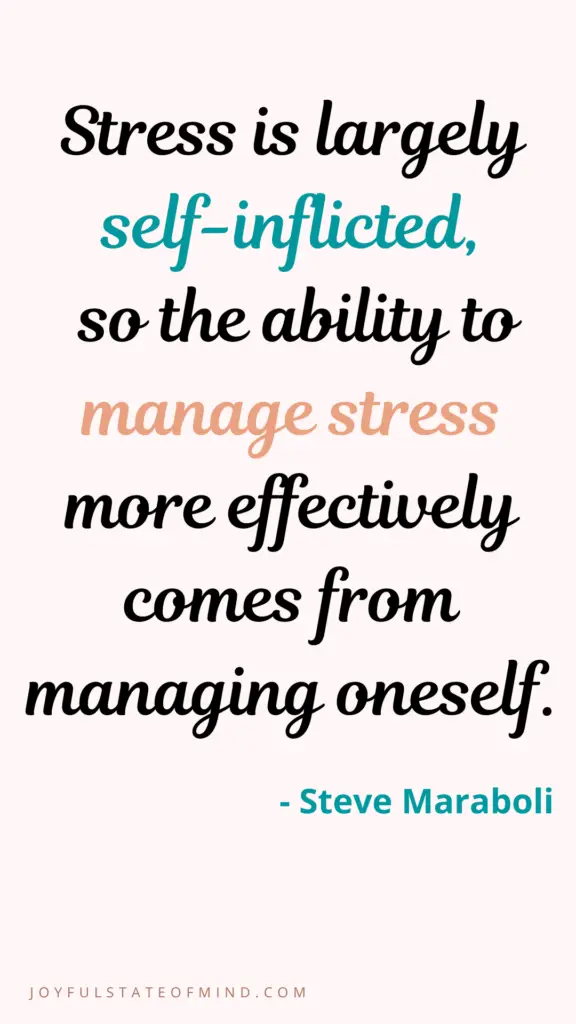
How To Start: Stress-Free Journaling That Works

Journaling can initially feel overwhelming, but it doesn’t have to be. Guided prompts make it simple, even if you’re not a writer or don’t know where to start.
With prompts, you don’t have to worry about what to say or how much to write. They help you focus on one thought, making it easier to release stress and feel calmer in just a few minutes a day.
Journaling isn’t about perfection—it’s about finding what works for you and giving yourself the space to reflect, recharge, and reset. Give it a shot—it’s doable for anyone. ✅
Tips for Starting Your Stress-Relief Journey
1. Invest in a Guided Journal
Blank pages can be intimidating, but a guided journal makes it effortless. Prompts give you direction, helping you focus your thoughts and reduce stress without overthinking.
I created a powerful 30-day stress-relief journal bundle with thoughtful prompts and printable resources to help you feel calmer and more grounded. It’s easy, practical, and perfect for anyone ready to take control of their stress.
Click on the image below to grab your copy now and start your journey toward a more peaceful mind. It’s a small investment with a big impact!
2. Let Go of Expectations
There’s no “right” way to journal. It’s not about perfect writing or big insights—it’s about showing up for yourself, even for a few minutes. Let go of judgment and enjoy the process.
3. Find Your Flow
There’s no perfect time to journal—do what works for you. Whether taking five minutes first thing in the morning or during a quiet moment, pick a time that feels natural and can fit into your daily routine to become a healthy habit.
Thoughtful Journaling Prompts for Stress-Relief
Here are 24 stress-relief journal prompts to help get you started. There’s no need to tackle all of them at once; choose a few that resonate with you and go from there.
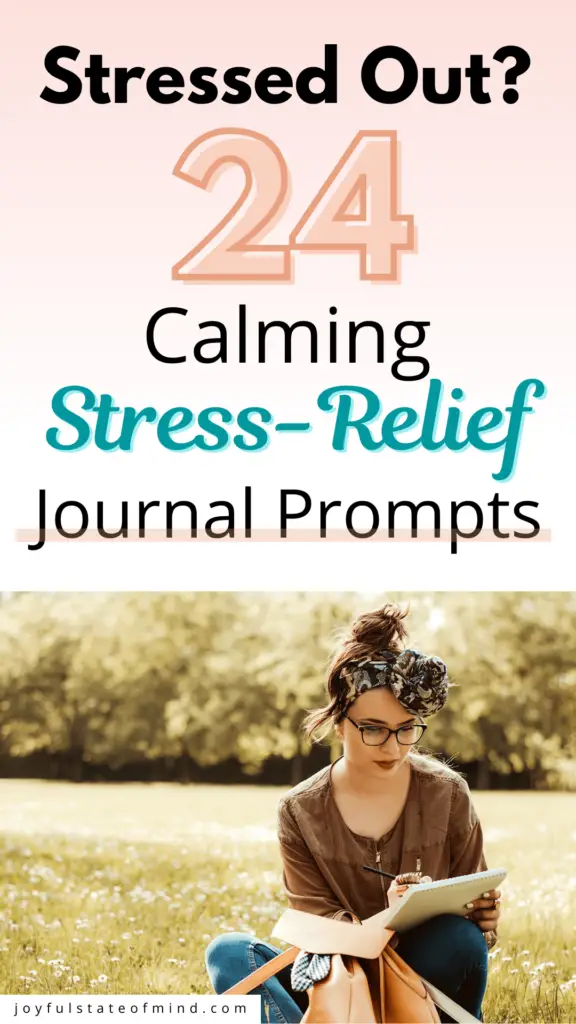
1. Write about two things you’re grateful for.
It’s easy and almost automatic to think about what’s wrong with our lives and what we want to change, so listing blessings in your life is a great strategy. When you practice gratitude regularly, it’s an empowering mindset shift.
2. What’s out of your control today?
We often worry about things we can’t control (like bad weather), but dwelling on them only adds stress. Writing them down helps you release their hold so you can focus on what you can control.
3. What is a recurring negative thought you struggle with?
Once you write one (or two things) down, start to challenge that thought with some of the questions below. These questions are a potent way to reframe negative thoughts and remove their power:
- Do I have concrete evidence to support this?
- Is this an emotionally driven thought or a logical one?
- Would other people see it the same way?
4. Name three songs that instantly make you happy and why. 🎶
Music is food for our souls. Thinking about why these songs make you happy is a mood booster; if you can listen to those songs today, even better. Listening to gospel music and having worship time every morning lifts my spirits and reminds me I’m not alone.
5. How stressed do you feel on a scale of 1-10 (1 = no stress and 10 = extremely stressed)? Why?
This prompt helps you know your stress level so you can address it rather than keep pushing through the day, as we often do. If you’re highly stressed, take some time to think of a few things you can do to lower that stress, such as:
- Take breaks more often
- Practice deep breathing
- Do pilates or stretching
6. Draw a simple picture of something that makes you happy. Now, write about why it makes you happy.
Art is therapeutic because it gets you to relax and focus on something positive. You’re not competing with anyone or trying to be the next Van Gogh, so let go, grab some markers, and have fun with this prompt.
7. What are some things you’re looking forward to today?
This question can lift your mood by focusing on things that make your heart happy. It can be as simple as hugs from your kid(s) after school, eating your favourite food, or chatting with a friend.
8. List one or two positive “I am” affirmations you can repeat to yourself today to stay calm or encourage yourself.
I believe in powerful self-love affirmations because they’ve been transformational for me. Affirmations are an easy and quick activity to do but can make a difference in how you feel when you’re consistent with them.

9. Practice positive self-talk. List one of your accomplishments, two of your strengths, and something you’re proud of.
Learning to become your inner BFF and manage your mean inner critic will significantly help lower your stress and anxiety. This is essential to developing self-compassion.
10. Even though I’m going through stress, (fill in blanks)______________always puts a smile on my face because_________________.
This stress-relief journal prompt is designed to help you reframe your day, remove the power from whatever is stressing you, and focus on something that gives you joy.
11. Write about a time you made a positive difference in someone’s life. How did that make you feel?
It’s not easy to take compliments, and we shy away from taking credit for things we’ve done to help others. This prompt isn’t to boast about yourself or be arrogant. It’s a way to encourage yourself and boost your confidence.
12. The funniest movie I ever watched was__________________. Write about some of the funny moments.
I’m a big believer in having fun and not taking yourself too seriously. Recalling hilarious scenes from a movie and laughing is a great way to reduce stress and enjoy a few moments during a hard day.
Related Post: The 43 Best Funny Stress-Relief Quotes
Journaling Prompts for Stress-Relief Continues…
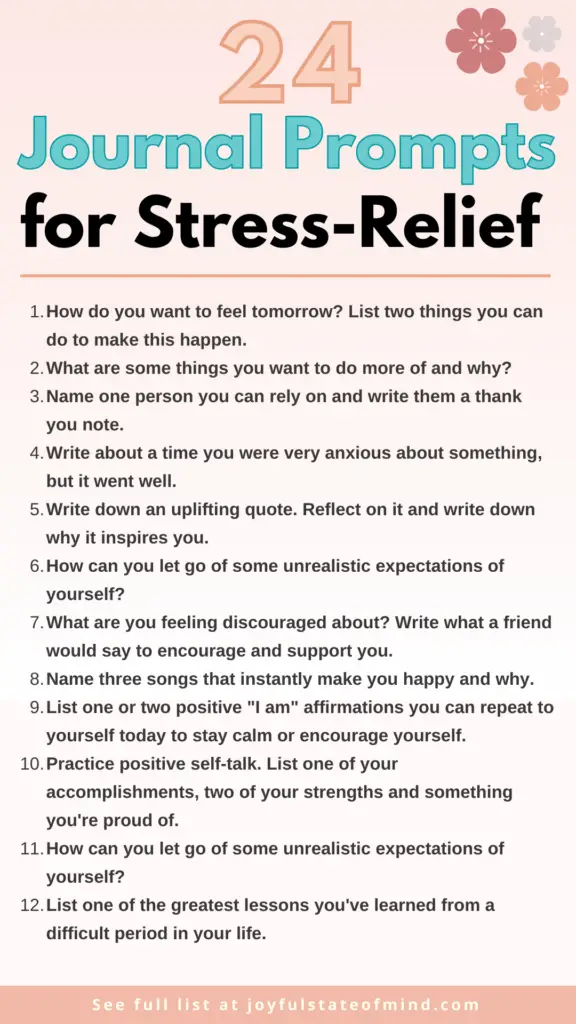
13. What are you feeling discouraged about? Write what a friend would say to encourage and support you.
This prompt will help you build self-compassion because you practice showing yourself grace. Being kinder to yourself is a mantra I live by and one that I’m committed to helping you develop; it’s key to being less stressed and thriving.
14. Do you make time to relax every day? If not, how can you do so?
Self-care is another essential factor in living a joyful life. For tons of great self-care ideas, check out the related post below:
15. How can you let go of some unrealistic expectations of yourself?
Self-compassion is necessary for this prompt; when you’re hard on yourself, a chronic perfectionist, and focus on the constant hustle, you’re not showing kindness. Those unrealistic expectations are emotionally exhausting and can lead to burnout.
16. Write down an uplifting quote. Reflect on it and write down why it inspires you. Are there any steps you can take to apply this to your own life?
I love inspirational quotes and Bible verses. Sometimes, a simple statement is all you need to put things into perspective and shift your mindset. 🙌
17. List two things that have gone right in your life recently.
Our brains naturally have a negativity bias, so we always think about the negatives and can easily recall difficult or painful experiences. Regularly listing things that went well can help shift your negative thought patterns, significantly impacting your happiness and stress levels.
18. Write about a time you were very anxious about something, but it went well.
Anxious thoughts come from us focusing on the future and uncertainties, so this prompt will help remind you that those thoughts aren’t always accurate.
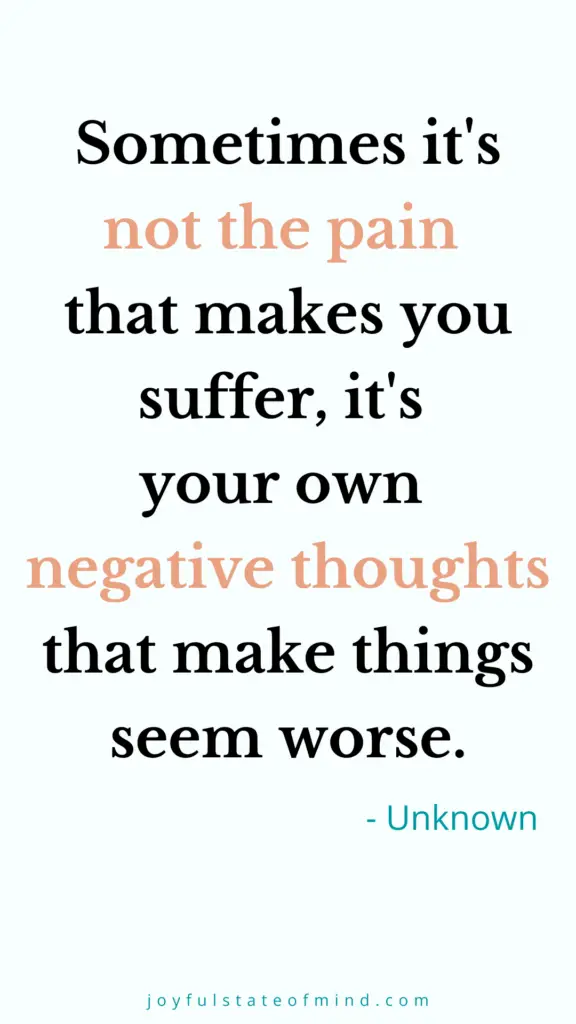
Related Post: 30 Powerful Stress-Relief Quotes

19. How do you want to feel tomorrow? List two things you can do to make this happen.
Being intentional about how we want our day to go, how we want to feel, and what we think is a crucial step in managing stress and disappointments.
20. What are some things you want to do more of and why?
Reflecting on what brings you fulfillment can help reduce stress. It’s natural to focus on what we don’t want, but shifting your focus to what you want allows you to take steps toward making it a reality rather than just dreaming about it.
21. Name one person you can rely on and write them a heartfelt thank you note.
Sharing kindness with others is a great way to lift your spirits; you never know how impactful those words may be.
Side note: At the beginning of the COVID pandemic, my girls wrote thank-you cards to frontline family members to show their support and appreciation. A couple of years later, they saw that their Tio (Uncle) hung those cards on his bulletin board as they meant a lot to him, and they were over the moon that he kept them.
22. What is one lesson you’ve learned from a difficult period in your life?
Problems are our greatest teachers and often bring about transformation and personal growth because you only have two choices: sink or swim. Writing this out helps to change our perspective for new challenges that arise.
23. What small things that won’t matter in the long run upset you?
We all have minor annoyances—like misplaced items, slow drivers, or bad hair days—that can stress us out more than they should. Instead of letting them ruin your day, think of ways to let them go or reframe them so they don’t bother you as much.
24. Take time to challenge your limiting beliefs about yourself.
Write down 1–2 beliefs that hold you back, such as I’m not smart enough or I don’t have what it takes. Limiting beliefs are false judgments we make about ourselves, and they can stop us from reaching our potential.
Challenge these thoughts by reflecting on your strengths, past accomplishments, and positive feedback you’ve received. Shifting your perspective can help you build confidence, take more risks, and move closer to your goals. Recognizing these beliefs is the first step toward letting them go.
Journaling Prompts for Stress-Relief: You’ve Got This!
Feeling relaxed, less stressed, and more joyful is doable for you.
Guided journaling is one of the most straightforward self-help strategies to help get you there. Once you start, journaling can become an effortless habit that you look forward to doing, and it helps set up your day for success.
As a relatively new fan of journaling, I can tell you that it’s helped me change my perspective on stress and better handle it.
Guided journaling is my favourite because it helps me relax and is enjoyable. So whether you’ve journaled before or not, simple journal sheets are all you need to reduce stress, and then you’ve got this! I have that covered for you below. ⬇️
Reduce Stress, Restore Calm Stress-Management Journal
Life isn’t about eliminating all stress (that’s biologically impossible for our brain)—it’s about managing it in a way that supports your well-being. Chronic stress can hold you back, but healthy, manageable stress can help you grow.
The Reduce Stress & Restore Calm Journal Bundle is your guide to shifting from overwhelm to balance. This printable journal bundle is designed to help you let go of what you can’t control, live in the moment, and truly enjoy life.
Packed with simple, proven techniques and encouraging resources, this journal makes stress relief easy and practical. With printable tools and prompts inspired by research and therapy, it’s like having a personal coach for your mind.
Just click on the image below to grab a copy and take the first step toward a less stressful life with minimal effort and maximum impact. ⬇️
Happy Journaling! ❤️
Resources:
1. 6 Benefits of Journaling and 9 Tips for Getting Started
2. Stress in America™ 2020: A National Mental Health Crisis
3. What is Mental Illness? Mental Health & Addiction Treatment
4. STRESS FACTS
5. https://www150.statcan.gc.ca/n1/daily-quotidien/210924/dq210924a-eng.
6. htmSTRESS FACTS
7. Same as above
8. Emotional and physical health benefits of expressive writing | Advances in Psychiatric Treatment | Cambridge Core
9. Same as above
10. Same as above
11. 5 Benefits of Journaling for Mental Health
12. Journaling Can Relieve Stress (& Anxiety!) | Starting Point Behavioral Healthcare
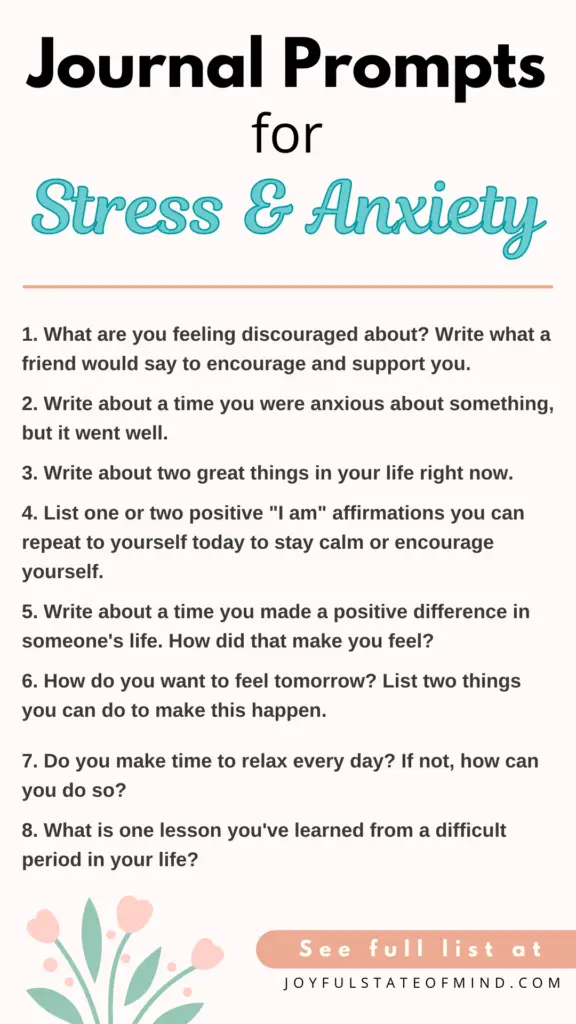
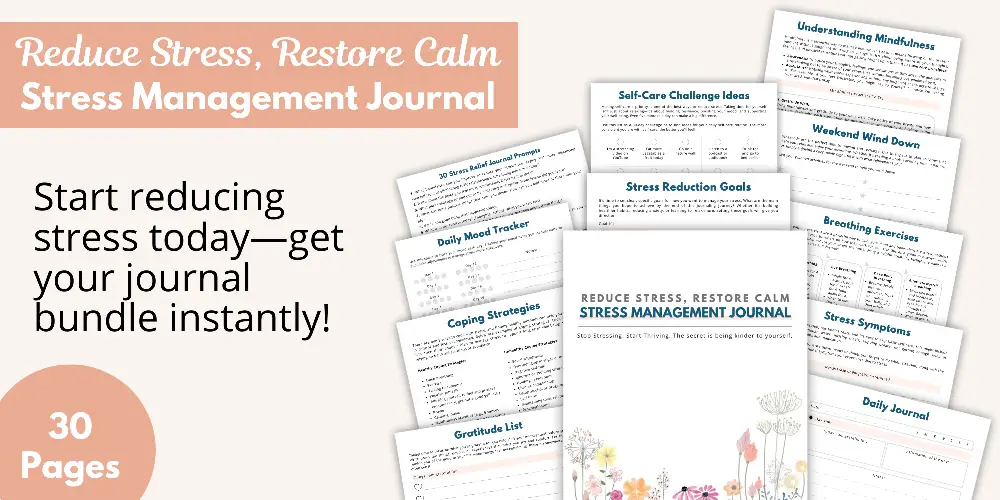






I know journaling is so helpful, and I have journals. These prompts are motivating me to try it again!
Hi Jill, I agree journaling is helpful. I have blank journals, too, but I prefer the ease of using a guided journal with prompts, so I hope you’ll try again with mine, too:)
Journaling always helps me, esp when I am anxious about something. I love affirmations, I even use them when I’m running!
Carrie
Hi Carrie, Journaling is great for reducing anxiety and stress! I’m the same, I love affirmations, too, and using them when you’re running is such a good idea!